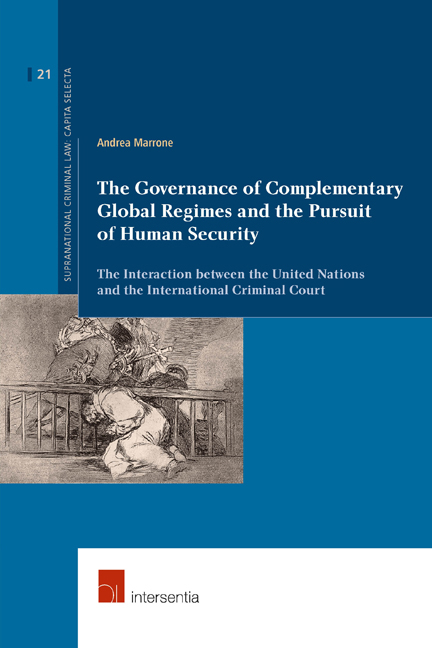 The Governance of Complementary Global Regimes and the Pursuit of Human Security
The Governance of Complementary Global Regimes and the Pursuit of Human Security Book contents
- Frontmatter
- Preface
- Study Outlook
- Contents
- List of Abbreviations
- INTRODUCTION
- PART I THE QUEST OF COMPLEMENTARITY AND THE DILEMMA OF HUMAN SECURITY
- PART II THE GOVERNANCE OF COMPLEMENTARY GLOBAL REGIMES: CHALLENGES, OBSTACLES AND CONCERNS
- PART III THE HUMANITARIAN ESCALATIONS OF LAST RESORT AND THEIR GOVERNANCE IN THE FIELD OPERATIONS
- 6 The International Responses to Mass Atrocities in Africa and the Criminal Regime in the Sudan
- 7 Multidimensional Operations and the Issue of Cooperation in the Democratic Republic of Congo (DRC)
- 8 Concluding Assessment. The governance architecture dealing with individuals in situations of war and crime
- Executive Summary
- APPENDICES
- Treaties, Legal Texts and Sources
- Bibliography
- About the Author
Executive Summary
from PART III - THE HUMANITARIAN ESCALATIONS OF LAST RESORT AND THEIR GOVERNANCE IN THE FIELD OPERATIONS
Published online by Cambridge University Press: 15 December 2017
- Frontmatter
- Preface
- Study Outlook
- Contents
- List of Abbreviations
- INTRODUCTION
- PART I THE QUEST OF COMPLEMENTARITY AND THE DILEMMA OF HUMAN SECURITY
- PART II THE GOVERNANCE OF COMPLEMENTARY GLOBAL REGIMES: CHALLENGES, OBSTACLES AND CONCERNS
- PART III THE HUMANITARIAN ESCALATIONS OF LAST RESORT AND THEIR GOVERNANCE IN THE FIELD OPERATIONS
- 6 The International Responses to Mass Atrocities in Africa and the Criminal Regime in the Sudan
- 7 Multidimensional Operations and the Issue of Cooperation in the Democratic Republic of Congo (DRC)
- 8 Concluding Assessment. The governance architecture dealing with individuals in situations of war and crime
- Executive Summary
- APPENDICES
- Treaties, Legal Texts and Sources
- Bibliography
- About the Author
Summary
PROBLEM STATEMENT
In this study the governance of complementary global regimes fighting against war and crime is based on the principles of the rule of law, multilateralism, collective responsibility, global solidarity and mutual accountability. These principles of governance promote social progress, human rights and the achievement of sustainable peace. In the current international legal and political order urgent solutions are required in the short, middle and long term balancing the ‘right’ of humanitarian intervention and its transition to the ‘responsibility’ to protect civilians with every means. Legal frameworks are required preserving fundamental individual rights while extending the criminal accountabilities equally when dealing with the international crimes characterizing conflict and post-conflict situations. The preservation of the rule of law has the potential to impact order and stability in transition societies while also retaining universal values shared by the world community. However, the ways international humanitarian law and human rights law may provide a relevant legal framework applicable in situations not qualifying as an armed conflict is still not clear, including the accountability mechanisms, law enforcement, and civilian protection measures in conflict and post-conflict situations. The historical, political and legal factors of such lacuna are extensively examined in the struggle to achieve a democratic global architecture of governance dealing with war and crime and based on human security. In order to measure the aspects of democratic governance, further research would still be required per situation, keeping in mind that a perfect analytical formula does not exist, while the theory offers valuable principles for the policy formulation to prevent, react and rebuild the devastation in conflict and post-conflict situations.
In the last decade the inquiries of legality of the ‘right’ of humanitarian intervention in international law received valuable and extensive scholarly analysis. The risk of unilateral humanitarian intervention derived from the failure of the collective security system established after WWII was characterized by the delegating role of the UN Security Council to military ad hoc coalitions as the only alternative to the inaction in case of mass atrocity crimes.
- Type
- Chapter
- Information
- The Governance of Complementary Global Regimes and the Pursuit of Human SecurityThe Interaction between the United Nations and the International Criminal Court, pp. 355 - 364Publisher: IntersentiaPrint publication year: 2016


